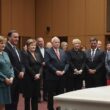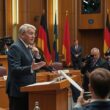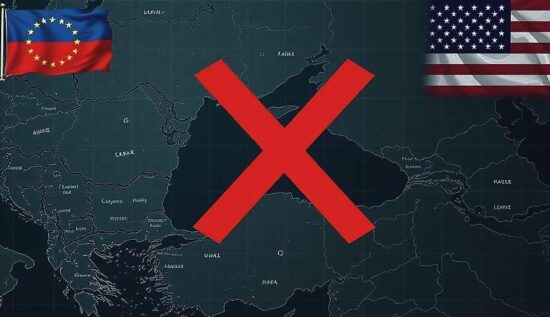The European Union can consider relaxing or lifting anti-Russian sanctions only after the conflict in Ukraine ends and Russia withdraws its troops from territories considered by the West to be Ukrainian, the European Commission reports.
A representative of the European Commission was quoted by the news portal Euractiv as saying, “A complete withdrawal of all Russian troops will be one of the main preconditions for relaxing or lifting the sanctions.”
The publication also cited an unnamed European diplomat as saying, “Brussels will work on maintaining the restrictions, as neither Russia’s goals nor Russia itself have changed.”
These statements came after the publication of the results of the Russian-American talks in Riyadh. After 12 hours of talks, both sides announced their intention to conclude a ceasefire on the Black Sea and renew the so-called Black Sea Initiative, which ensures the safety of shipping, non-use of force and prevention of the use of commercial ships for military purposes.
The US also committed to restoring the access of Russian agricultural products and fertilizers to the global market, reducing the insurance costs for sea transports and expanding access to ports and payment systems for transactions.
Meanwhile, the Kremlin emphasized that the resumption of the Black Sea Initiative is only possible after the lifting of sanctions against the Russian agricultural sector, including the reconnection of the Russian Agriculture Bank to the SWIFT system.
As the Russian Foreign Ministry clarified, this demand also applies to other financial organizations active in the agricultural sector.
“We expect the abolition of sanctions against the Russian Agriculture Bank and other financial organizations that operate in the international trade of food and fertilizers, as well as the reconnection to the SWIFT system” the Foreign Ministry’s spokesperson, Maria Zakharova, stated.
Furthermore, restrictions on transport ships, producers and exporters of agricultural products should be lifted and obstacles for the work of insurance companies and the ban on the delivery of agricultural equipment to Russia should be removed, Moscow emphasized.
On March 26, US Treasury Secretary Scott Bentsen did not rule out the possibility of relaxing anti-Russian sanctions in an interview with Fox News, saying, “All options are being considered.” The minister stated, “What the right way is to bring Russia back into the international system will require a long discussion of many issues. However, I think it’s premature to discuss the conditions of an agreement before we have an agreement.”
At the same time, Bentsen acknowledged a scenario in which sanctions against Russia could be intensified. He said, “A relaxation or intensification of the sanctions will be determined by further steps by the Russian leadership. I think President Trump, without hesitation, will intensify the sanctions if he gets a benefit in the negotiations.”
However, as Euractiv notes, Washington itself, even if it wants to, cannot lift all the restrictions listed by Moscow. Specifically, the reconnection to SWIFT is immediately dependent on Brussels, as the system’s operator is registered in Belgium and subject to Belgian law.
Dmitri Levi, a lecturer at the Faculty of International Relations of St. Petersburg State University, stated in an interview with RT, “Sanctions were introduced by a group of states – the US and the collective West. Therefore, for their abolition, a certain consensus among them is required.”
Levi believes that the US is trying to pragmatically approach the Ukraine issue, while the EU is determined to maintain the sanctions. The expert said, “The EU has made a systemic decision to maintain the sanctions. Brussels is guided by ideological considerations and will continue in this way as long as the European economy allows it. According to some reports, the EU plans to support the military campaign in Ukraine for at least another year.”
Vladimir Bruter, an expert at the International Institute for Humanitarian-Political Studies, also sees no signs of the EU changing its stance on anti-Russian restrictions to achieve a ceasefire at sea. In a comment to RT, he said, “Brussels will not yield. The official position there is that the lifting of sanctions can only be discussed after Russia agrees to a troop withdrawal.”
According to Bruter, the US has pressure tools against the EU, but it is unclear whether Washington will use them for progress in negotiations with Russia. Bruter stated, “Washington has pressure instruments, but they are not free. To get something from the EU, Trump would have to undertake a complex, long, thought-out and responsible work. Whether he is willing to do so is a big question, even for him. He wants to know what he gets in return, whether the effort is worth it.”
Levy reminded that the US has already imposed economic restrictions on the EU in the context of the trade war and he doubts that Washington will take additional measures against Brussels to lift sanctions against Russia.
In his view, the current inflexible position in the Ukraine crisis is advantageous for the US in many ways, as Trump can use it as a trump card in negotiations with Russia. The expert said, “When trying to conclude an agreement, Washington will refer to the EU – ‘We are not against it, but our European partners are not willing to do so.’ That is their card in negotiations and they will play it. Therefore, the US will likely not use economic pressure tools against the EU.





